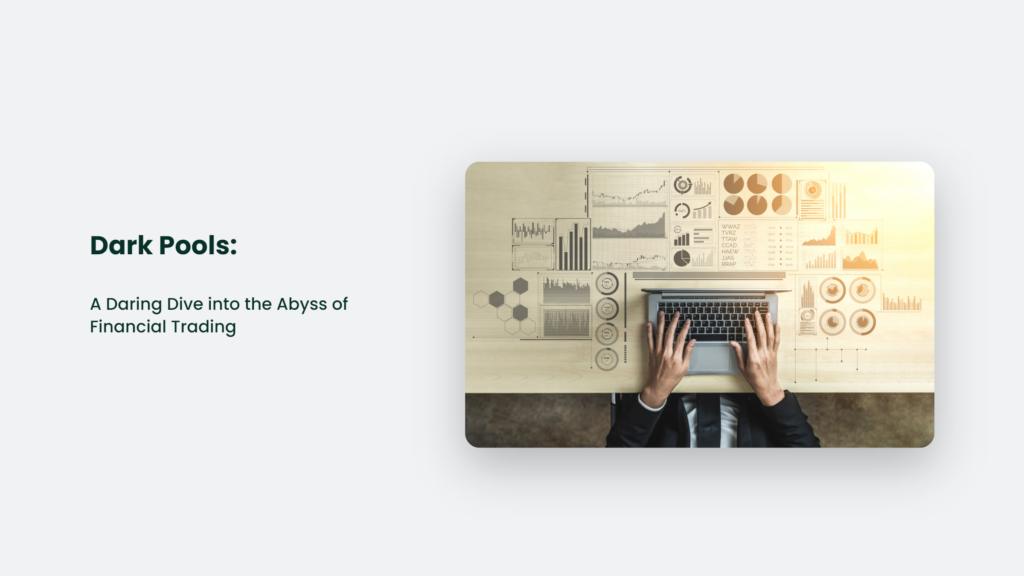

Dark Pools: A Daring Dive into the Abyss of Financial Trading

As Seen On
Ladies and gentlemen, welcome to the strange world of financial trading, where the murkier corners of Wall Street’s underworld hide an intriguing beast known as “dark pools.”
Yes, you heard that right. I said dark pools, not the edgy name of a metal band or the title of a subpar horror movie. What exactly are these mysterious entities? Stick around, and I promise I’ll illuminate this obscurity for you.

The Mysterious Waters of Dark Pools
Imagine this: A stockbroker walks into a bar. The bartender asks, “Why the long face?” The broker replies, “I just lost a million dollars in a dark pool.” The bartender then asks, “What’s a dark pool?” The broker replies, “I have no idea; I couldn’t see a thing.”
Yeah, the joke is terrible, but so is losing a million dollars without understanding why or how it happened. But that’s just the kind of thing that can go down in these anonymous trading venues known as dark pools.
They’re like black holes of the financial universe, swallowing up massive shares and spitting them out with little to no transparency. Are you starting to get why they’re called “dark”?
Let’s untangle this a bit. Dark pools are private exchanges where securities trading is conducted out of the public eye. These exchanges facilitate trading large shares without dramatically affecting the market price—a feature quite appealing to institutional investors who want to make substantial transactions without stirring up the stock market’s emotional seas.
Why Dive Into Dark Pools?
Why would anyone want to dive into these murky waters? The answer is simple: Big Fish. No, not the Tim Burton film, but institutional investors with money to splash.
They want to do their big business quietly without causing ripples that disturb the surface. It’s like the Godfather making a deal in the back room of a dimly lit restaurant. What? Too melodramatic? Maybe, but you get the point.
As for the statistics, it’s estimated that approximately 15% of total U.S. trading volume was conducted through dark pools in 2020. And according to the Wall Street Journal, this figure has risen over the last decade. That’s not small potatoes. It’s like the entire population of California decided to play hide-and-seek in Wall Street’s backyard.
A Pool Party or a Pool Shark?
Now, you might be wondering: “Are these dark pools regulated? Or are they a wild west, filled with bandits and desperadoes?” The answer, my friend, is both yes and no. It’s like asking if a zebra is black or white.
The Financial Industry Regulatory Authority (FINRA) does monitor dark pools to some extent, but the pools’ inherently opaque nature poses significant challenges. It leads us to a critical question that might have even Shakespeare turning in his grave: To regulate or not to regulate?
Dipping Your Toes or Diving In Headfirst?
Choosing to swim in dark pools isn’t for everyone. If you’re an average Joe investor, getting into a shark tank with a raw steak tied around your neck might be more like getting into a shark tank.
Dark pools serve a specific purpose for particular investors but are not exactly what you’d call a democratic space.
Imagine walking into a secret club where all the big shots are wheeling and dealing. Sure, you could try to rub elbows with them, but there’s a good chance you’d get your pocket picked. So, should small investors even try diving into these dark pools? To quote Dirty Harry, “A man’s got to know his limitations.”
Dark Pools: Financial Freedom Fighters or Fiscal Foes?
Here’s the million-dollar question (literally, in some cases): are dark pools good or bad for the market? The answer isn’t as black and white as you might think. In many ways, they’re like the financial market’s version of Batman – sometimes seen as villains, as heroes, always shrouded in darkness.
On the one hand, these shadowy exchanges allow for massive trades without causing unrest in the open market. That’s good, right? But on the other hand, they compromise transparency, which is a cornerstone of fair trading. So, what’s it going to be? Does their service to the financial Gotham justify their opaque operations? As the Joker would probably say, “It’s all part of the plan.”
Summary
Dark pools are a fascinating and controversial aspect of financial markets. They represent a dichotomy between the need for discreet, substantial trading and the market’s demand for transparency and fairness.
Their clandestine nature appeals to institutional investors, while their market manipulation potential triggers regulatory concern and public criticism.
Like the mythical Hydra, dark pools are complex beasts that cannot be simply slain with a single sword. They are an integral part of the financial landscape and will likely continue to evolve with the market.
Whether you see them as a necessary evil or misunderstood saviours, one thing is sure: they certainly make the finance world much more enjoyable.
Frequently Asked Questions:
Are dark pools legal?
Yes, they are legal but controversial due to their lack of transparency.
Who uses dark pools?
Primarily institutional investors, who need to make large trades without disrupting the market.
Final Thoughts
So, there you have it. A jaunt into the mysterious, shadowy world of dark pools. You might still be unsure about them, and that’s okay. After all, uncertainty is part of their charm, if you can call it that.
But as with any journey into the unknown, the important part is that you’re a little more enlightened than before.
Just remember, the next time you hear someone refer to “dark pools,” don’t assume they’re talking about some hipster indie band or a top-secret alien project. You can confidently tell them, “Ah, yes, dark pools. The murky underworld of financial trading. Very intriguing.”
As we exit this labyrinthine world of dark finance, I leave you with a quote from a philosopher whose wisdom transcends time and culture, Confucius: “Real knowledge is to know the extent of one’s ignorance.” So, until next time, keep asking questions, stay curious, and don’t be afraid of diving into the deep end—just maybe avoid those, particularly dark corners.
Konger
Up until working with Casey, we had only had poor to mediocre experiences outsourcing work to agencies. Casey & the team at CJ&CO are the exception to the rule.
Communication was beyond great, his understanding of our vision was phenomenal, and instead of needing babysitting like the other agencies we worked with, he was not only completely dependable but also gave us sound suggestions on how to get better results, at the risk of us not needing him for the initial job we requested (absolute gem).
This has truly been the first time we worked with someone outside of our business that quickly grasped our vision, and that I could completely forget about and would still deliver above expectations.
I honestly can't wait to work in many more projects together!
Disclaimer
*The information this blog provides is for general informational purposes only and is not intended as financial or professional advice. The information may not reflect current developments and may be changed or updated without notice. Any opinions expressed on this blog are the author’s own and do not necessarily reflect the views of the author’s employer or any other organization. You should not act or rely on any information contained in this blog without first seeking the advice of a professional. No representation or warranty, express or implied, is made as to the accuracy or completeness of the information contained in this blog. The author and affiliated parties assume no liability for any errors or omissions.

